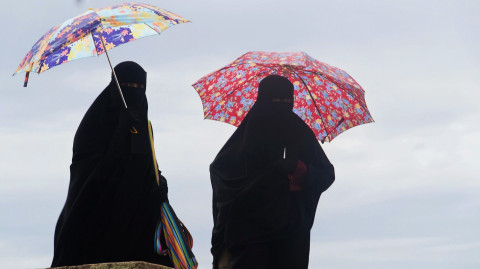This ban is a modern-day witch hunt
By banning the burka, the Dutch state is imposing its own view of what is right for Muslim women, write Berna Toprak and Nawal Mustafa on behalf of S.P.E.A.K. The feminist principle of women’s autonomy over their own bodies is now at risk.

Pixabay License
There had still been a glimmer of hope, until last week. Hospitals and public transport operators had said they would not enforce the burka ban, citing the unnecessary trouble it would cause. Yet, the headline in Wednesday’s Algemene Dagblad, a Dutch daily newspaper, dispelled all remaining hope. The newspaper opened with an article entitled ‘Burka ban: What is allowed and what not?’ The article poses four questions, the third of which is: ‘What can I do if I see someone wearing a burka?’ In the answer, the article explains to readers that if they object to the sight of a woman wearing a niqab, they may place her under citizen’s arrest. In other words, the witch hunt has now officially begun.
While the overwhelming majority of the Dutch population can take full pleasure in all the comforts of 2019, women who wear a niqab have now been forced back in time to 1719. To a time in which women of strong will or differing opinion were mercilessly persecuted.
The victims in this story are not those who feel uncomfortable at the sight of a woman wearing a niqab. The true victims are the approximately two hundred women who are being denied their right to self-determination. If this were really a matter of national security or public order, then where are all those violent burka-wearers? There is no evidence whatsoever to support any claims of a supposed risk. This is nothing more than a white fantasy as seen in films and on television. Let’s not confuse fantasy with facts. This is about our civil rights and the right of self-determination for women.
Although the Netherlands is a so-called emancipated country, in which women and men have equal rights, the state apparently believes that it has the right to determine which clothing are appropriate or not for a woman to wear.
After the Dutch Council of State rejected a previous version of the burka ban in 2012 because it infringed upon the freedom of religion, the Rutte II government still bent over backwards to bring this ban before the Dutch House of Representatives.
This is a product of the Islamophobic climate in the Netherlands today. After all, the view that Islam is the ultimate danger has legitimised the efforts of white males (who are already feeling cornered by the #MeToo movement) to play out their sexist, Islamophobic fantasies against innocent Muslim women. Apparently, the state presumes to know what’s best for women.
When can we, as a society, accept that women themselves know what is right for them? ‘Women are allowed to exist as long as they are open to our gaze.’ This is the underlying message of the law that bans the burka. It would appear that the Netherlands is not ready for women to have autonomy over their own bodies and their choice of whether to withdraw their bodies from the ‘public eye’.
This law is the result of a perverse obsession with two hundred women (0.001 percent of the Dutch population) who refuse to follow the rules of the white male elite on both the left and right in the Dutch House of Representatives. Let this be a warning to (white) feminists whose silence is deafening. As long as you remain complicit in this discourse, the feminist principle of women’s autonomy over their own bodies is under threat.
No matter what you think of the niqab, it is not the state’s role to decide how a woman presents and dresses herself. Women who wear a niqab must have autonomy over their own bodies. They make a conscious choice over the way in which they wish to lead their lives and what being a woman means to them. This ban is being used to once again force down our throats the notion that Muslim women are by definition suppressed by their families, religion and culture. It underscores the mindset of European superiority and is a result of the increasingly right-extremist political climate.
Two years ago, our Belgian sisters from BOEH! (Baas Over Eigen Hoofd, or ‘Autonomy Over Our Heads’), a feminist and anti-racist activism platform, described the situation as follows: ‘There is still hope for Muslim women in the Netherlands.’
Since then, the flame of hope has been extinguished, but we shall reignite that flame. We believe that the Netherlands can be a nation in which every woman has autonomy over her own body, womb and head. And we are calling out this demon for what it really is: this burka ban is a modern-day witch hunt.
Supported by:
S.P.E.A.K. (initiatiefnemers)
Stichting Meld Islamofobie
Maruf
Wonda Woman
Fufu & Dadels
Lillith Magazine
Hollandse Liefde
Bovengrondse
De Goedezaak
WOMEN Inc.
Bureau Clara Wichmann
Comité 21 Maart
Collectief tegen Islamofobie en Discriminatie (CTID)
Stichting Fahm Instituut
Black Queer Trans Resistance NL
MAARA Collective
MVVN
Dipsaus
Women’s March NL
New Urban Collective
Stop Blackface
Stem op een Vrouw
Izi Solution
Controle Alt Delete
H.J.O.S Nederland
Wereldvrouwen
WijBlijvenHier!
Intenationale Socialisten
Wit aan Zet
Al Nisa
Emcemo
Nisa4Nisa
Movement of Colour
Reclaim our Pride
Uitgeverij Chaos
Black Renaissance
SMN
Groningen Feminist Network
Stichting Dutch Moroccans United
SIOR - H
Blauwe Moskee
CMO
Kleurrijke Top 100
Transnational Institute (TNI)
Centrum de Middenweg
Stichting Alle Kleuren